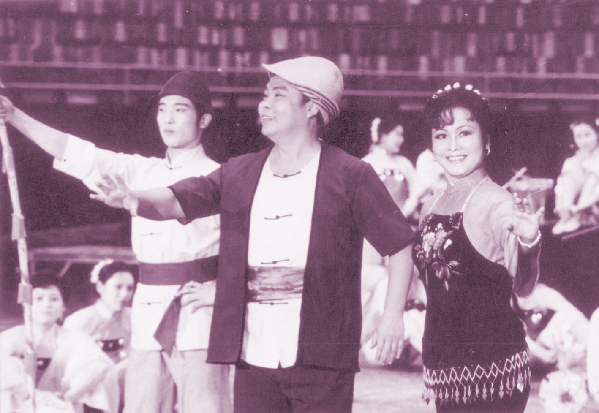 |
|
Liu and soprano Li Guyi performing the opera The Song of the Chinese Revolution in early 1980s.[Photo provided to chinadaily.com.cn] |
Chinese-style tenor
In the later years of his partnership with Guo, she immediately noticed the mature, orotund, vehement and versatile voice of the young performer, as well as his flexible and fluid stagecraft. In the prime opera of the troupe The White-Haired Girl, Liu was first assigned the role of a young man who saves the heroine from suffering, and then the role of an aged, peasant father. "The distinctions of the roles demanded a complete change in my sung performance, and I had to change the bright and high tones to a muffled, not dry but rather deep, intonation of the depressed father," he said.
Yet Liu only felt fully established as an actor-cum-singer when he played the role of the father in The Grievances of Dou E, or Snow in Summer in the mid-1960s. The role of Dou Tianzhang from a youth to a middle-aged scholar, who sought to right the wrong suffered by his daughter was rendered with comprehensive technical control over pitch, velocity, volume, breath, range, facial expressions, bodily movements and effects. His technical virtuosity guides the audience through a voyage of discovery in the theatrical and sonic possibilities of the human body and voice blended with constant high Cs, close to the glowing accounts of Luciano Pavarotti’s nine high Cs in Pour mon ame.
Unsettling the audience every time was the subtlety of Liu’s tone, the depth of his emotions and an aptitude for verbal power, which were mingled with dramatic movements of limbs, fingers and even the eyelids to convey the ecstasy and agony of a man seeking justice.
In the following years, with the exception of the "cultural revolution", Liu and Guo put on a dozen Western-style operas with Chinese tunes and storylines. "Together they brought about a blossoming of modern Chinese opera," CCTV host Meng Shengnan said in the program Weekly Classic of China Showbiz on April 26.
By the time Western style opera picked up its lost popularity in the late 1970s, Liu believed he had found his own style, a fusion of bel canto with traditional Peking Opera vocal techniques, quyi sung performances and folk songs. "The key methods of singing are the different positions of the larynx and the opening and closing of the chest, nasal and head cavities," he said. "Moreover, Chinese singing uses far fewer trills and vibration."
His maturity in singing skills shot him to nationwide stardom in 1985 in singing a great hit A Beautiful Legend, a theme song of a TV drama series The Legend of Wooden-fish Stone, which is still popular today.
According to Liang Junling, a music professor from Shanxi Normal University, the style of singing cultivated by Liu can be summed as typically Chinese style. "It carries Western methods of voicing, folk song flavors in technique, and the rhythmic appeal of traditional Chinese opera," he concluded after leading a research group in the study of Liu's singing.
|
|
|
|
|
|
